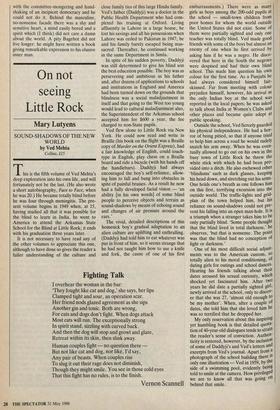On not seeing Little Rock
Mary Lutyens
SOUND-SHADOWS OF THE NEW WORLD by Ved Mehta
Collins, £15
This is the fifth volume of Ved Mehta's deep exploration into his own life, and will fortunately not be the last. (He also wrote a short autobiography, Face to Face, when he was 20.) He became totally blind before he was four through meningitis. The pre- sent volume begins in 1949 when, at 15, having studied all that it was possible for the blind to learn in India, he went to America to attend the Arkansas State School for the Blind at Little Rock; it ends with his graduation three years later.
It is not necessary to have read any of the other volumes to appreciate this one, although to have done so gives the reader a fuller understanding of the culture and close family ties of this large Hindu family. Ved's father (Daddyji) was a doctor in the Public Health Department who had com- pleted his training at Oxford. Living affluently in Lahore in a large house, he lost his savings and all his possessions when Lahore was ceded- to Pakistan in 1947; he and his family barely escaped being mas- sacred. Thereafter, he continued working in the same Department in Simla.
In spite of his sudden poverty, Daddyji was still determined to give his blind son the best education possible. The boy was as persevering and ambitious as his father and, after dozens of applications to schools and institutions in England and America had been turned down on the grounds that blindness was a social maladjustment in itself and that going to the West too young would lead to cultural maladjustment also, the Superintendent of the Arkansas school accepted him for $600 a year, the fee charged to non-State pupils.
Ved flew alone to Little Rock via New York. He could now read and write in Braille (his book on the flight was a Braille copy of Murder on the Orient Express), had a fair knowledge of English, could touch- type in English, play chess on a Braille board and ride a bicycle (with his hands off the handlebars). Daddyji had always encouraged the boy's self-reliance, allow- ing him to fall and bang into obstacles in spite of painful bruises. As a result he now had a fully developed facial vision — 'an ability [in his own words] of some blind people to perceive objects and terrain as sound-shadows by means of echoing sound and changes of air pressure around the ears.'
The vivid, detailed descriptions of this homesick boy's gradual adaptation to an alien culture are uplifting and enthralling. (Daddyji had told him to eat whatever was put in front of him, so it seems strange that he had not taught him how to use a knife and fork, the cause of one of his first embarrassments.) There were as many girls as boys among the 200-odd pupils at the school — small-town children from poor homes for whom the world outside the United States did not exist. Some of them were partially sighted and only one teacher was totally blind. Ved made good friends with some of the boys but almost an enemy of one when he first arrived by asking him if he was a negro. He disco- vered that here in the South the negroes were despised and had their own blind school. This made him question his own colour for the first time. As a Punjabi he had always considered himself fair- skinned. Far from meeting with colour prejudice himself, however, his arrival as the only Indian boy at the school was reported in the local papers; he was asked to talk about India at Women's Clubs and other places and became quite adept at public speaking. Outside the school, Ved fiercely guarded his physical independence. He had a hor- ror of being pitied, so that if anyone tried to help him across a road he would rudely snatch his arm away. When he was even- tually allowed to go out on his own in the busy town of Little Rock he threw the white stick with which he had been pro- vided into a ditch. He also eschewed other tlindisms' such as dark glasses, keeping his head down, and stretching out his arms. One holds one's breath as one follows him on this first, terrifying excursion into the outside world. The traffic-lights and grid- plan of the town helped him, but his reliance on sound-shadows could not pre- vent his falling into an open man-hole. It is a triumph when a stranger takes him to be only partially blind. 'Some people thought that the blind lived in total darkness,' he observes, 'but that is nonsense. The point was that the blind had no conception of light or darkness.'
One of his most difficult social adjust- ments was to the American custom, so totally alien to his moral conditioning, of dating girls for outings and school dances. Hearing his friends talking about their dates aroused his sexual curiosity, which shocked yet fascinated him. After two years he did date a partially sighted girl, newly arrived at the school, only to discov- er that she was 27, 'almost old enough to be my mother'. When, after a couple of dates, she told him that she loved him be was so terrified that he dropped her. My only reservation about this inspiring yet humbling book is that detailed quota- tion of 40-year-old dialogues tends to strain the reader's sense of conviction. Authen- ticity is restored, however, by the inclusion of some of Daddyji's and Ved's letters and excerpts from Ved's journal. Apart from .a photograph of the school building there is only one illustration — Ved in 1959, by the side of a swimming pool, evidently being told to smile at the camera. How privileged we are to know all that was going 011 behind that smile.


























































 Previous page
Previous page